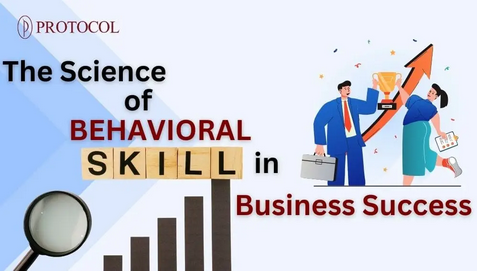Blog Information
- Posté par : Protocol Institute
- Posté sur : Jun 05, 2025
- Vues 53
- Catégorie : Général
- La description : The Science of Behavioral Skills: Why They Matter in Business
Aperçu
Behavioral skills have become the secret ingredient to success in today’s fast-paced business world. Whether you’re climbing the corporate ladder or managing a team, skills like communication, leadership, and adaptability can make or break your journey. But what exactly are behavioral skills, and why do they matter so much in business? Let’s dive in.
What Are Behavioral Skills?
Behavioral skills are the interpersonal abilities that influence how you interact with others in a professional environment. These include
- Communication skills
- Leadership abilities
- Adaptability
- Teamwork
Think of them as the glue that holds technical skills together, enabling you to collaborate effectively and solve problems efficiently.
Why Are Behavioral Skills Important in Business?
In the business world, technical know-how gets your foot in the door, but behavioral skills keep you there. Why? Because every organization is a web of relationships. Without strong interpersonal skills, even the most skilled professionals can find themselves struggling to lead, influence, or even work cohesively with a team.
The Role of Communication Skills in Business
Effective communication is the backbone of every successful business. Whether it’s a team meeting, a client pitch, or a simple email, your ability to convey ideas clearly impacts outcomes. Good communication minimizes misunderstandings, fosters collaboration, and builds trust.
Key Behavioral Skills for Leaders
Leadership goes beyond delegating tasks. Great leaders inspire, motivate, and build a culture of trust. Some key skills include:
- Emotional Intelligence: Understanding and managing emotions to connect with others.
- Decision-Making: Analyzing situations and making informed choices.
- Conflict Resolution: Addressing issues effectively to maintain harmony.
How to Develop Behavioral Skills?
Developing behavioral skills is a continuous process. Here’s how to start:
- Self-Assessment: Identify areas of improvement.
- Feedback: Seek input from peers or mentors.
- Skill Development Courses: Enroll in programs focused on communication, leadership, or other relevant skills.
Behavioral Training Examples in the Workplace
Behavioral training sessions can be transformative. Here are some examples:
- Role-Playing: Practicing scenarios like conflict resolution or negotiation.
- Team-Building Exercises: Activities that foster collaboration.
- Leadership Workshops: Focused training for aspiring leaders.
Impact of Behavioral Skills on Team Performance
Teams with strong behavioral skills outperform those without. Why? Because they:
- Communicate more effectively.
- Resolve conflicts constructively.
- Work cohesively towards shared goals.

Behavioral Skills in Conflict Resolution
Conflict is inevitable, but behavioral skills can turn disputes into opportunities for growth.
- Active listening
- Empathy
- Problem-solving
Plays key roles in addressing conflicts constructively.
Soft Skill Development Courses: Choosing the Right One
Not all courses are created equal. When choosing a soft skill development course:
- Identify your goals (e.g., improve communication skills).
- Research course content and reviews.
- Opt for courses with practical, hands-on training.
Visit us for more information :- soft skill development courses
Tracking Progress in Behavioral Training
Progress tracking ensures you’re on the right path. Use tools like:
- Performance Reviews: Regular feedback from supervisors.
- Self-Assessments: Reflecting on your growth.
- Peer Feedback: Insights from colleagues.
Overcoming Challenges in Behavioral Skill Development
Developing behavioral skills isn’t always easy. Common challenges include:
- Resistance to Change: Overcome this by starting small.
- Lack of Time: Prioritize soft skill development as part of your routine.
- Limited Resources: Leverage online tools and free resources.
Conclusion:
Behavioral skills are more than a buzzword; they’re a necessity in today’s business landscape. As organizations continue to value interpersonal abilities alongside technical expertise, the demand for soft skills development courses and soft skills training will only grow. Investing in these soft skills isn’t just about career growth — it’s about building a better, more cohesive workplace.
Visit us for more information :- personality development online training
